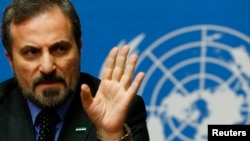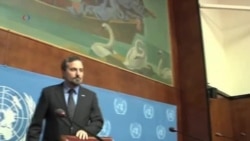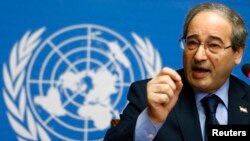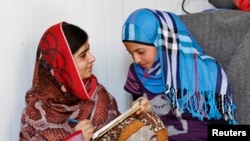GENEVA —
Five days of peace talks aimed at ending Syria's civil war ended in a bitter impasse on Friday with Syrian government and opposition negotiators trading accusations over who was to blame for the stalemate at the UN-mediated talks in Geneva.
U.N. mediator Lakhdar Brahimi met separately with the Syrian government and opposition delegations Friday. When the meetings ended, the two parties held separate news conferences to vent frustrations with each other's negotiating positions.
The one issue that both delegations were able to agree upon was that the other party was responsible for the deadlock in the three-week old peace process.
Watch related video by VOA's Jeff Seldin
"We have reached a point which we cannot overcome without the presence of another team [Syrian government delegation] who is willing to deal with a peaceful solution," Syrian opposition spokesman Louay Safi told reporters, adding that the five days of negotiations had come to a "dead end'' because of the government delegation's "belligerence.''
Syrian Deputy Foreign Minister Fayssal Mikdad countered that the opposition came to the talks with an "unrealistic agenda.''
"I think those who do not give a chance for discussion and agreement on combating terrorism are definitely not part of the Syrian people," he said.
Safi told reporters his side had submitted a proposal, which gives a comprehensive view of what it believes should be present in a transitional government for Syria.
He said the plan touches on issues regarding a cease-fire, the release of prisoners, humanitarian access and other elements needed to create a political solution for ending the violence. Unfortunately, he said the government side has not responded to this proposal.
"We came to these negotiations with a lot of doubts that we have a negotiating party, that the regime is serious about a political solution," Safi said. "We put before the regime a proposal for such a solution that addresses the concerns of all Syrians. It is about five pages, 24 separate items and the regime would not even really acknowledge that proposal. And, so, that is quite, quite disappointing."
Safi said this is not a deal breaker, adding that his delegation will not withdraw from the negotiations. But he urged both the United States and Russia, who are the main backers of the Geneva Conference, to put pressure on the Syrian regime to negotiate in good faith.
Syrian government position
The government delegation put a different spin on things. It agreed with the opposition that no progress toward a political solution has been made. But Syrian Deputy Foreign Minister, Fayssal Mikdad blamed the Opposition's insistence on talking only about a transitional governing body for the deadlock.
"We are ready to discuss everything and we reaffirmed in all the meetings that we have held with you, we reaffirmed that we insist on starting with the ending of violence and the fighting of terrorism," he said. "We are willing to discuss the question of the transitional governing body once we have reached an agreement on fighting terrorism."
The two sides have not budged from these positions since the talks started. The regime refuses to discuss the transitional process because it would entail the removal from power of Syrian President Bashar al-Assad.
US, Russia weigh in
The United States, which supports the rebels, and Russia, which supports the Syrian government, have both criticized the deadlock.
A senior U.S. official said Friday, Syria's government delegation has
been "stonewalling every step of the way'' in Geneva peace talks and Washington expects Russia to pressure them to engage seriously in the peace process.
"We hope and trust that because the Russians believe in a political solution, a diplomatic solution, they will urge the regime to engage in a serious and constructive way,'' the official told Reuters news agency. "The regime hasn't done so yet, that speaks for itself.''
Secretary of State John Kerry said during a visit to Beijing Friday the U.S. is concerned the Geneva talks are not producing the kind of discussion on a transition government that is needed. He said President Barack Obama has asked people in his administration to think about various options for Syria "that may or may not exist."
Brahimi determined to find solution
U.N. mediator, Lakhdar Brahimi normally briefs on the status of the talks, but on this occasion, decided to stay away from the two parties' public airing of grievances.
Thursday he told reporters that he sees failure staring him in the face, but insisted that the United Nations will not leave any stone unturned to find a solution to a conflict that has killed more than 130,000 people and displaced 9.5 million others.
Jeff Seldin in Washington contributed to this report, some information provided by Reuters
U.N. mediator Lakhdar Brahimi met separately with the Syrian government and opposition delegations Friday. When the meetings ended, the two parties held separate news conferences to vent frustrations with each other's negotiating positions.
The one issue that both delegations were able to agree upon was that the other party was responsible for the deadlock in the three-week old peace process.
Watch related video by VOA's Jeff Seldin
"We have reached a point which we cannot overcome without the presence of another team [Syrian government delegation] who is willing to deal with a peaceful solution," Syrian opposition spokesman Louay Safi told reporters, adding that the five days of negotiations had come to a "dead end'' because of the government delegation's "belligerence.''
Syrian Deputy Foreign Minister Fayssal Mikdad countered that the opposition came to the talks with an "unrealistic agenda.''
"I think those who do not give a chance for discussion and agreement on combating terrorism are definitely not part of the Syrian people," he said.
Safi told reporters his side had submitted a proposal, which gives a comprehensive view of what it believes should be present in a transitional government for Syria.
He said the plan touches on issues regarding a cease-fire, the release of prisoners, humanitarian access and other elements needed to create a political solution for ending the violence. Unfortunately, he said the government side has not responded to this proposal.
"We came to these negotiations with a lot of doubts that we have a negotiating party, that the regime is serious about a political solution," Safi said. "We put before the regime a proposal for such a solution that addresses the concerns of all Syrians. It is about five pages, 24 separate items and the regime would not even really acknowledge that proposal. And, so, that is quite, quite disappointing."
Safi said this is not a deal breaker, adding that his delegation will not withdraw from the negotiations. But he urged both the United States and Russia, who are the main backers of the Geneva Conference, to put pressure on the Syrian regime to negotiate in good faith.
Syrian government position
The government delegation put a different spin on things. It agreed with the opposition that no progress toward a political solution has been made. But Syrian Deputy Foreign Minister, Fayssal Mikdad blamed the Opposition's insistence on talking only about a transitional governing body for the deadlock.
"We are ready to discuss everything and we reaffirmed in all the meetings that we have held with you, we reaffirmed that we insist on starting with the ending of violence and the fighting of terrorism," he said. "We are willing to discuss the question of the transitional governing body once we have reached an agreement on fighting terrorism."
The two sides have not budged from these positions since the talks started. The regime refuses to discuss the transitional process because it would entail the removal from power of Syrian President Bashar al-Assad.
US, Russia weigh in
The United States, which supports the rebels, and Russia, which supports the Syrian government, have both criticized the deadlock.
A senior U.S. official said Friday, Syria's government delegation has
been "stonewalling every step of the way'' in Geneva peace talks and Washington expects Russia to pressure them to engage seriously in the peace process.
"We hope and trust that because the Russians believe in a political solution, a diplomatic solution, they will urge the regime to engage in a serious and constructive way,'' the official told Reuters news agency. "The regime hasn't done so yet, that speaks for itself.''
Secretary of State John Kerry said during a visit to Beijing Friday the U.S. is concerned the Geneva talks are not producing the kind of discussion on a transition government that is needed. He said President Barack Obama has asked people in his administration to think about various options for Syria "that may or may not exist."
Brahimi determined to find solution
U.N. mediator, Lakhdar Brahimi normally briefs on the status of the talks, but on this occasion, decided to stay away from the two parties' public airing of grievances.
Thursday he told reporters that he sees failure staring him in the face, but insisted that the United Nations will not leave any stone unturned to find a solution to a conflict that has killed more than 130,000 people and displaced 9.5 million others.
Jeff Seldin in Washington contributed to this report, some information provided by Reuters








